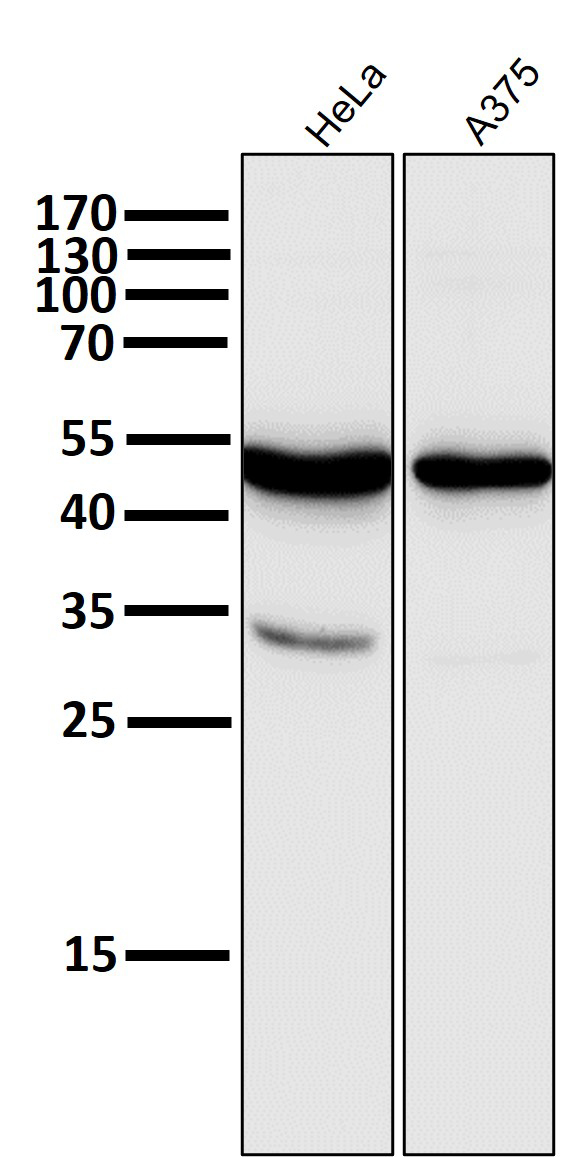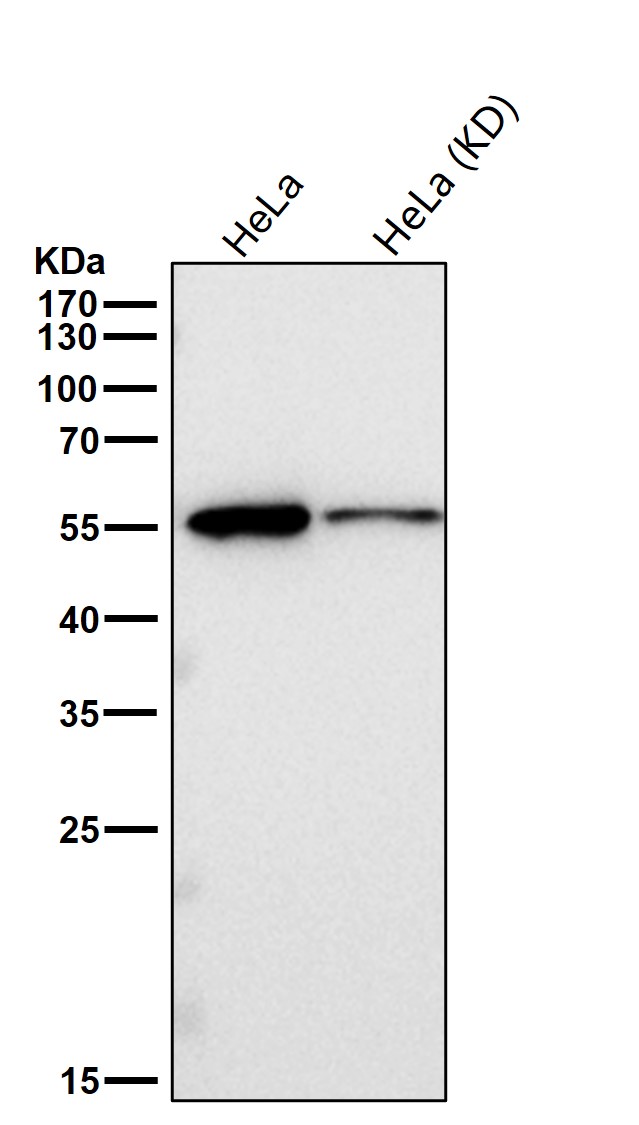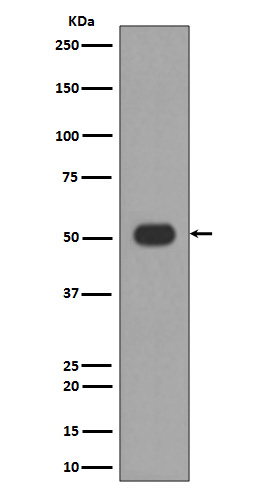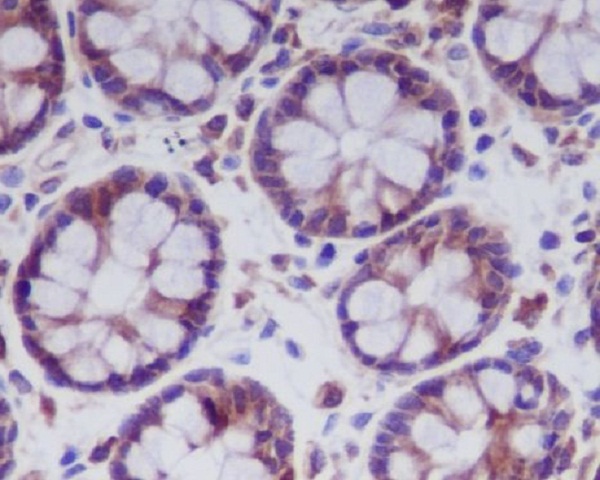



| WB | 咨询技术 | Human,Mouse,Rat |
| IF | 咨询技术 | Human,Mouse,Rat |
| IHC | 1/100-1/200 | Human,Mouse,Rat |
| ICC | 技术咨询 | Human,Mouse,Rat |
| FCM | 咨询技术 | Human,Mouse,Rat |
| Elisa | 咨询技术 | Human,Mouse,Rat |
| Aliases | Mixed lineage kinase domain-like protein; hMLKL; ;MLKL |
| WB Predicted band size | 54 kDa |
| Host/Isotype | Rabbit IgG |
| Antibody Type | Primary antibody |
| Storage | Store at 4°C short term. Aliquot and store at -20°C long term. Avoid freeze/thaw cycles. |
| Species Reactivity | Human |
| Immunogen | A synthesized peptide derived from human MLKL |
| Formulation | Purified antibody in PBS with 0.05% sodium azide,0.05% BSA and 50% glycerol. |
+ +
以下是3-4篇关于MLKL抗体的代表性文献,按研究领域分类概括:
---
1. **文献名称**:*Mixed Lineage Kinase Domain-like Protein Mediates Necroptosis via a Mitochondrial Pathway*
**作者**:Sun L. et al.
**摘要**:该研究首次证明MLKL是坏死性凋亡(necroptosis)的关键执行蛋白,通过特异性抗体定位发现MLKL在激活后向线粒体聚集,导致细胞膜破裂。研究为MLKL抗体的功能验证提供了关键证据。
2. **文献名称**:*Activation of MLKL in the necrosome requires oligomerization and membrane localization*
**作者**:Hildebrand J.M. et al.
**摘要**:通过结构生物学和抗体标记技术,揭示了MLKL在坏死小体(necrosome)中的寡聚化机制,并开发了针对MLKL磷酸化位点(p-MLKL)的特异性抗体,用于检测细胞坏死过程中的激活状态。
3. **文献名称**:*Distinct roles of RIPK1 and MLKL in TNF-induced necroptosis signaling*
**作者**:Tanzer M.C. et al.
**摘要**:比较了不同MLKL抗体的特异性,发现某些抗体可区分人源和小鼠源MLKL,为跨物种研究提供了工具。研究还表明MLKL的C端结构域抗体对坏死性凋亡检测具有高灵敏性。
4. **文献名称**:*MLKL triggers necroptosis by forming pores in mitochondrial membranes*
**作者**:Conos S.A. et al.
**摘要**:利用MLKL敲除细胞系和特异性抗体,证实MLKL通过在线粒体膜形成孔道执行坏死性凋亡,并开发了适用于流式细胞术的MLKL抗体标记方法,用于体内外模型检测。
---
**注**:以上文献多发表于*Nature*、*Cell Death & Differentiation*等期刊,主要涉及MLKL抗体的功能验证、结构研究及疾病模型(如炎症、癌症)应用。实际引用时建议核对具体年份与期刊卷号。
MLKL (Mixed Lineage Kinase Domain-Like) is a key effector protein in the necroptosis pathway, a form of regulated cell death distinct from apoptosis. Structurally, MLKL contains an N-terminal four-helix bundle domain and a C-terminal pseudokinase domain. Upon activation by receptor-interacting protein kinase 3 (RIPK3) via phosphorylation, MLKL undergoes oligomerization and translocates to the plasma membrane, disrupting membrane integrity and triggering necroptosis. This process is critical in inflammatory responses, pathogen defense, and diseases like cancer, neurodegenerative disorders, and ischemia-reperfusion injury.
MLKL antibodies are essential tools for studying necroptosis mechanisms. They enable detection of MLKL expression, phosphorylation (e.g., at Ser358/Thr357 in humans), and subcellular localization using techniques like Western blot, immunofluorescence, and immunohistochemistry. Specific antibodies distinguish between inactive monomeric and active oligomeric MLKL forms, providing insights into pathway activation status. Both monoclonal and polyclonal variants are available, often raised in rabbits or mice. Rigorous validation using MLKL-knockout cell lines ensures specificity, as off-target binding can complicate interpretations.
These antibodies have advanced research in disease models, drug discovery (e.g., necroptosis inhibitors), and biomarker development. Their applications help unravel MLKL's dual roles in promoting cell death and non-necroptotic signaling in inflammation, making them indispensable for understanding pathological mechanisms and therapeutic targeting.
×